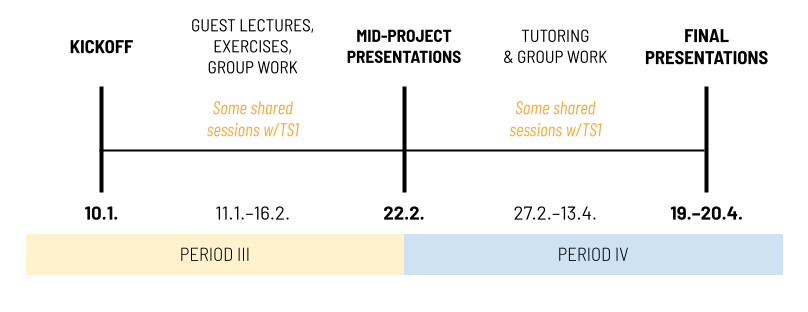ARTX-C1013 - Thematic Studio II, Lecture, 10.1.2023-20.4.2023
This course space end date is set to 20.04.2023 Search Courses: ARTX-C1013
Översikt
-
Thematic Studio II spring schedule and materials are found below. The topic for this year is Safety and Security in the Digital Domain. The course is organized as follows:

Period III
Week 1
Tue 10.01. 09.15–17.00 Y307a - Kickoff, group formation
Wed 11.01. 11.00–17.00 A1-A123 - Group mingling, guest lecture by Laura EuroWeek 2
Tue 17.01. 09.15–17.00 U9-U271 - Final group formation, benchmarking lecture and group work
Wed 18.01. 10.00–17.00 A1-A123 - Guest lectures, Guest lecture by Waltteri Jokela and another by Antti HietaniemiWeek 3
Tue 24.01. 09.15–17.00 Online (Zoom) - Tutoring for benchmarking report, finalizing report (you can use U271 for your groupwork if needed)
Wed 25.01. - Benchmarking report DL
Thu 26.01. 09.15–12.00 U9-U271 - Ideation lecture and workshop exerciseWeek 4
Tue 31.01. 09.15–17.00 Online (Zoom) - Tutoring for idea presentations 9–12, independent work otherwise
Thu 02.02. 09.15–12.00 U9-U271 - Idea presentationsWeek 5
Tue 07.02. 09.15–17.00 Online (Zoom, not U271) - Diffusion lecture and group work
Thu 09.02. 09.15–12.00 Online (Zoom) - Tutoring for diffusion essayWeek 6
Tue 14.02. 09.15–17.00 U9-U271 - Instructions for Mid-project presentations, group work
Wed 15.02. 13.15–17.00 A1-A123 - TS1 Mid-project presentations, TS2 as opponents.
Thu 16.02. 09.15–12.00 Online (Zoom) - Tutoring for mid-project presentationsWeek 7 - MID-PROJECT PRESENTATIONS
Wed 22.02. 09.30–14.30 A1-A123 - Presentations with TS1 students as opponents
Fri 24.02. - Diffusion report DLPeriod IV
Week 8
Mon 27.02. 13.15–15.00 Independent work, no meeting
Thu 02.03. 09.15–17.00 Online (Zoom) - Project work tutoringWeek 9
Mon 06.03. 13.15–15.00 A2-A215 - Scenarios lecture
Thu 09.03. 09.15–17.00 Online (Zoom) - Project work tutoringWeek 10
Mon 13.03. 13.15–15.00 (A2-A215) - Independent work
Thu 16.03. 09.15–17.00 Online (Zoom) - Project work tutoringWeek 11
Mon 20.03. 13.15–15.00 (A2-A215) - Independent work
Thu 23.03. 09.15–17.00 Online (Zoom) - Project work tutoringWeek 12
Mon 27.03. 13.15–15.00 A2-A215 - Evaluation tutorial and tips
Thu 30.03. 09.15–17.00 Online (Zoom) - Project work tutoringWeek 13
Mon 03.04. 13.15–15.00 A2-A215 - Testing day with TS1
Thu 06.04. Easter Holiday – no teachingWeek 14
Mon 10.04. Easter Holiday – no teaching
Thu 13.04. 09.15–17.00 Online (Zoom) - Tutoring in the morning, Info on final presentation & report in the afternoon.Week 15 - FINAL PRESENTATIONS
Wed 19.04. 13.15–16.15 TS1 opponent duty
@ Väre, R028/010 K Corridor (in front of 3D print) & R028/Q019 Kipsari LobbyThu 20.04. 09.45–15.00 TS2 final presentations
@ Otakaari 5, Jeti-A208dMon 08.05. - Final report DL
-
You can find additional reading materials and uploaded lecture slides here.
-
Groups URL
Groups are formed and listed here.
-
Assignments and grading criteria are found here.
-
Booking timeslots (Excel) URL
Use this spreadsheet to book timeslots for presentations and tutoring.
-
Videocall link (Zoom) URL
This is the Zoom call for remote lectures and tutoring sessions.
-
File sharing (Onedrive) URL
You can share large files through here.
-
Recordings of presentations (Panopto) URL
Here are the recordings from the mid-project and final presentations in Panopto.
